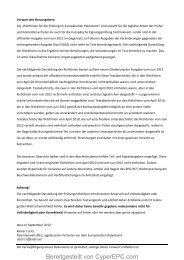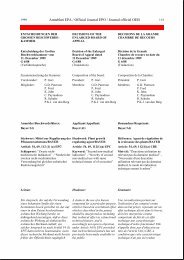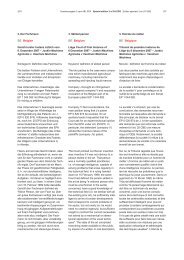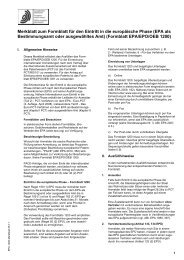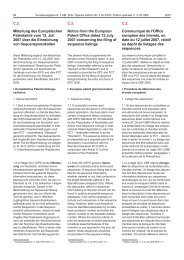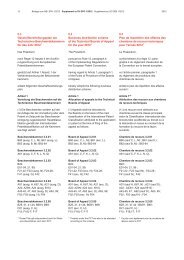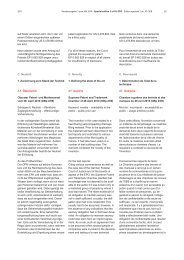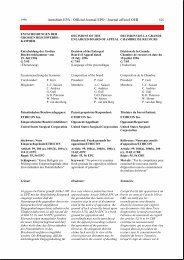Sonderausgabe 1 zum AB - CyberEPC
Sonderausgabe 1 zum AB - CyberEPC
Sonderausgabe 1 zum AB - CyberEPC
Create successful ePaper yourself
Turn your PDF publications into a flip-book with our unique Google optimized e-Paper software.
142 <strong>Sonderausgabe</strong> 1 <strong>zum</strong> <strong>AB</strong>l. EPA Special edition 1 of OJ EPO Edition spéciale 1 du JO OEB 2011<br />
zur Reibungsverringerung gerichtet ist?<br />
Oder von einem Anspruch, der auf die<br />
Förderung der Verwendung des Zusatzes<br />
oder auf Werbung hierfür in Verbindung<br />
mit einem Anspruch auf die Reibungsverringerung<br />
gerichtet ist? Solche<br />
Ansprüche sind neu, stützen sich nicht<br />
auf eine Absicht an sich, sondern vielmehr<br />
auf objektive Anhaltspunkte für<br />
eine Absicht, und beeinträchtigen die<br />
Verwendung zu dem alten Zweck nicht.<br />
Wer für die neue Wirkung wirbt, macht<br />
direkten Gebrauch vom Beitrag des<br />
Patentinhabers <strong>zum</strong> Stand der Technik –<br />
anders als derjenige, der das Erzeugnis<br />
lediglich in Kenntnis dieser Wirkung<br />
verwendet.<br />
42. Auch mit diesem Ansatz hätte es<br />
vor Inkrafttreten des EPÜ im Vereinigten<br />
Königreich Probleme gegeben. In der<br />
Entscheidung Ciba Geigy (Durr's<br />
Applications) [1977] RPC 83 ging es um<br />
die Entdeckung, dass ein bekanntes<br />
Unkrautvernichtungsmittel gegen dikotyles<br />
Unkraut zur selektiven Bekämpfung<br />
von monokotylem Unkraut bei monokotylen<br />
Feldfrüchten eingesetzt werden<br />
konnte. Der Court of Appeal stellte sich<br />
auf einen legalistischen Standpunkt und<br />
lehnte es ab, einen mit einer entsprechenden<br />
Gebrauchsanweisung versehenen<br />
Anspruch auf die bekannte Verbindung<br />
zuzulassen. Er urteilte, dass dies<br />
keine "Art neues Erzeugnis" sei. Für die<br />
Geschäftswelt ist es aber genau das.<br />
43. Man mag einwenden, dass damit ein<br />
"Gedankendelikt" geschaffen wird, was<br />
gegen die altmodischen Grundsätze verstößt,<br />
die ich erwähnt habe. Da aber das<br />
Patentsystem dazu dient, den Gebrauch<br />
von erfinderischen Ideen durch Dritte zu<br />
verhindern, gibt es keinen Grund, den<br />
Schutz nicht auf grundsätzlich alle Tätigkeiten<br />
auszudehnen, die von der Idee<br />
Gebrauch machen, sofern diese Form<br />
von Schutz nicht potentiell bekannte<br />
Tätigkeiten beeinträchtigen kann.<br />
44. Dass diese einfachen Problemlösungen<br />
sich nicht durchgesetzt haben, ist<br />
meines Erachtens auf die vermeintliche<br />
fehlende Flexibilität bei der Abfassung<br />
von Ansprüchen zurückzuführen. Eine<br />
größere Flexibilität bei der Anspruchsuse<br />
of the additive with a claim for friction<br />
reduction? Such claims are novel, rely<br />
on objective indicia of intention rather<br />
than intention per se, and do not interfere<br />
with the use for the old purpose. Anyone<br />
who advertises the new effect is making<br />
direct use of the patentee's contribution<br />
to the art, unlike the mere user with<br />
knowledge, who is not.<br />
42. This approach too would have had<br />
problems in the UK before the EPC.<br />
The decision in Ciba Geigy (Durr's<br />
Applications) [1977] RPC 83 was<br />
concerned with the discovery that a<br />
known herbicide for dicotyledenous<br />
weeds could be used for selectively<br />
combating monocotyledonous weeds in<br />
monocotyledenous crops. The Court of<br />
Appeal took a legalistic approach and<br />
refused to allow a claim to the known<br />
compound with instructions for use:<br />
holding that it was not a "manner of new<br />
manufacture". But to commercial men<br />
and women that is exactly what it was.<br />
43. Some would say that this is to create<br />
a "thought" tort, which runs against the<br />
old fashioned principles which I have<br />
referred to. But, given that the patent<br />
system is designed to prevent the use by<br />
others of inventive ideas, there is every<br />
reason in principle why protection should<br />
extend to all activities which make use<br />
of the idea, provided that the form of<br />
protection does not have the potential to<br />
interfere with known activities.<br />
44. The reason that these simple solutions<br />
to the problem were not adopted is,<br />
I believe, because of a perceived lack<br />
of flexibility in claim drafting. But more<br />
flexibility in claim drafting would allow us<br />
to grant appropriate protection without<br />
les frottements ? Ou d'une revendication<br />
portant sur la publicité ou la promotion<br />
de l'utilisation de l'additif et revendiquant<br />
une réduction des frottements ? Ces<br />
revendications sont nouvelles, sont<br />
fondées sur des indices objectifs d'intention<br />
plutôt que sur une simple intention<br />
en général et ne font pas obstacle à<br />
l'utilisation pour l'ancienne finalité.<br />
Quiconque fait de la publicité pour le<br />
nouvel effet du produit se sert directement<br />
de la contribution du titulaire du<br />
brevet à l'état de la technique, contrairement<br />
au simple utilisateur.<br />
42. Cette façon d'aborder la question<br />
aurait aussi posé des problèmes au<br />
Royaume-Uni avant la CBE. Le jugement<br />
dans l'affaire Ciba Geigy (Durr's<br />
Applications) [1977] RPC 83 concernait<br />
la découverte selon laquelle un herbicide<br />
connu et utilisé pour les mauvaises<br />
herbes dicotylédones pouvait aussi<br />
servir à l'élimination sélective des<br />
mauvaises herbes monocotylédones<br />
dans les récoltes monocotylédones. La<br />
Cour d'appel a adopté une approche<br />
légaliste et a rejeté une revendication<br />
portant sur le composé connu avec le<br />
nouveau mode d'emploi du produit.<br />
Les juges ont estimé qu'il ne s'agissait<br />
pas d'une "modalité nouvelle de fabrication".<br />
Pour les personnes chargées de<br />
commercialiser le produit, c'est pourtant<br />
à quoi cela équivalait.<br />
43. D'aucuns diraient que cela revient à<br />
créer un "délit fictif" contraire aux<br />
anciens principes dont j'ai parlé. Cependant,<br />
puisque le système de brevets est<br />
conçu pour interdire à des tiers d'utiliser<br />
des idées inventives, il y a toutes les<br />
raisons d'estimer en principe que la<br />
protection d'un brevet doit être étendue à<br />
toutes les activités qui utilisent le brevet,<br />
sous réserve que la forme de la protection<br />
ne risque pas de faire obstacle à la<br />
pratique d'activités connues de l'état de<br />
la technique.<br />
44. Si ces solutions simples au problème<br />
n'ont pas été adoptées, cela est dû, je<br />
crois, au manque de souplesse perçu<br />
dans la formulation des revendications.<br />
Or, une plus grande souplesse dans la<br />
rédaction des revendications permettrait



